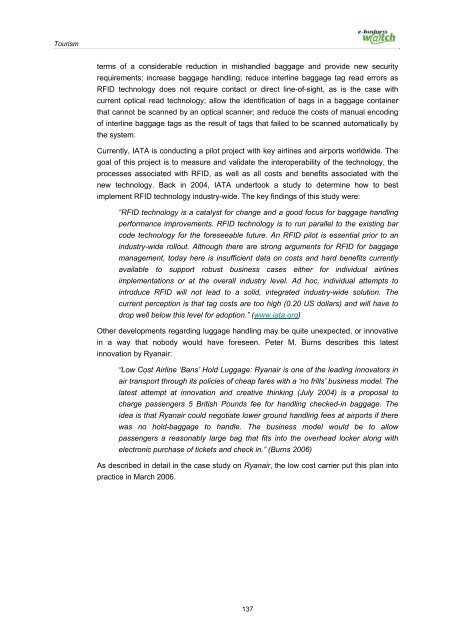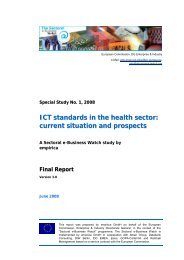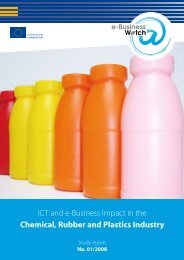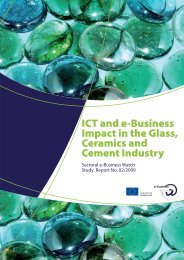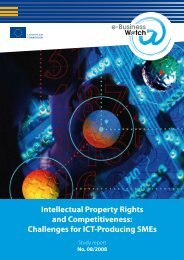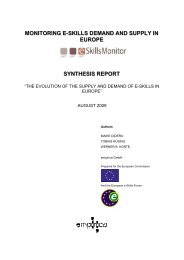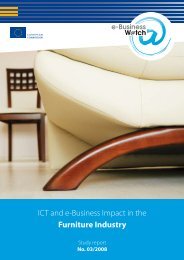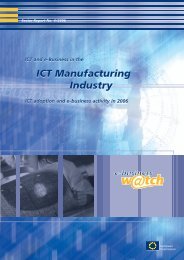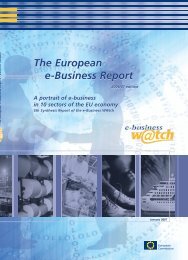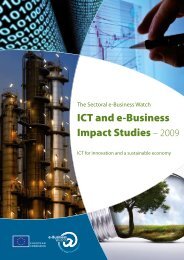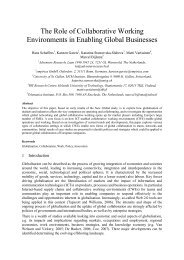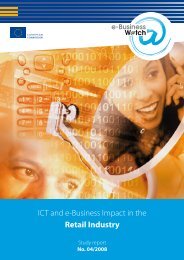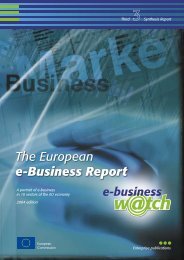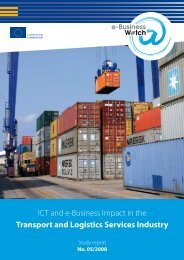ICT and e-business in the tourism industry ICT adoption ... - empirica
ICT and e-business in the tourism industry ICT adoption ... - empirica
ICT and e-business in the tourism industry ICT adoption ... - empirica
You also want an ePaper? Increase the reach of your titles
YUMPU automatically turns print PDFs into web optimized ePapers that Google loves.
Tourism<br />
terms of a considerable reduction <strong>in</strong> mish<strong>and</strong>led baggage <strong>and</strong> provide new security<br />
requirements; <strong>in</strong>crease baggage h<strong>and</strong>l<strong>in</strong>g; reduce <strong>in</strong>terl<strong>in</strong>e baggage tag read errors as<br />
RFID technology does not require contact or direct l<strong>in</strong>e-of-sight, as is <strong>the</strong> case with<br />
current optical read technology; allow <strong>the</strong> identification of bags <strong>in</strong> a baggage conta<strong>in</strong>er<br />
that cannot be scanned by an optical scanner; <strong>and</strong> reduce <strong>the</strong> costs of manual encod<strong>in</strong>g<br />
of <strong>in</strong>terl<strong>in</strong>e baggage tags as <strong>the</strong> result of tags that failed to be scanned automatically by<br />
<strong>the</strong> system.<br />
Currently, IATA is conduct<strong>in</strong>g a pilot project with key airl<strong>in</strong>es <strong>and</strong> airports worldwide. The<br />
goal of this project is to measure <strong>and</strong> validate <strong>the</strong> <strong>in</strong>teroperability of <strong>the</strong> technology, <strong>the</strong><br />
processes associated with RFID, as well as all costs <strong>and</strong> benefits associated with <strong>the</strong><br />
new technology. Back <strong>in</strong> 2004, IATA undertook a study to determ<strong>in</strong>e how to best<br />
implement RFID technology <strong>in</strong>dustry-wide. The key f<strong>in</strong>d<strong>in</strong>gs of this study were:<br />
“RFID technology is a catalyst for change <strong>and</strong> a good focus for baggage h<strong>and</strong>l<strong>in</strong>g<br />
performance improvements. RFID technology is to run parallel to <strong>the</strong> exist<strong>in</strong>g bar<br />
code technology for <strong>the</strong> foreseeable future. An RFID pilot is essential prior to an<br />
<strong>in</strong>dustry-wide rollout. Although <strong>the</strong>re are strong arguments for RFID for baggage<br />
management, today here is <strong>in</strong>sufficient data on costs <strong>and</strong> hard benefits currently<br />
available to support robust <strong>bus<strong>in</strong>ess</strong> cases ei<strong>the</strong>r for <strong>in</strong>dividual airl<strong>in</strong>es<br />
implementations or at <strong>the</strong> overall <strong>in</strong>dustry level. Ad hoc, <strong>in</strong>dividual attempts to<br />
<strong>in</strong>troduce RFID will not lead to a solid, <strong>in</strong>tegrated <strong>in</strong>dustry-wide solution. The<br />
current perception is that tag costs are too high (0.20 US dollars) <strong>and</strong> will have to<br />
drop well below this level for <strong>adoption</strong>.” (www.iata.org)<br />
O<strong>the</strong>r developments regard<strong>in</strong>g luggage h<strong>and</strong>l<strong>in</strong>g may be quite unexpected, or <strong>in</strong>novative<br />
<strong>in</strong> a way that nobody would have foreseen. Peter M. Burns describes this latest<br />
<strong>in</strong>novation by Ryanair:<br />
“Low Cost Airl<strong>in</strong>e ‘Bans’ Hold Luggage: Ryanair is one of <strong>the</strong> lead<strong>in</strong>g <strong>in</strong>novators <strong>in</strong><br />
air transport through its policies of cheap fares with a ‘no frills’ <strong>bus<strong>in</strong>ess</strong> model. The<br />
latest attempt at <strong>in</strong>novation <strong>and</strong> creative th<strong>in</strong>k<strong>in</strong>g (July 2004) is a proposal to<br />
charge passengers 5 British Pounds fee for h<strong>and</strong>l<strong>in</strong>g checked-<strong>in</strong> baggage. The<br />
idea is that Ryanair could negotiate lower ground h<strong>and</strong>l<strong>in</strong>g fees at airports if <strong>the</strong>re<br />
was no hold-baggage to h<strong>and</strong>le. The <strong>bus<strong>in</strong>ess</strong> model would be to allow<br />
passengers a reasonably large bag that fits <strong>in</strong>to <strong>the</strong> overhead locker along with<br />
electronic purchase of tickets <strong>and</strong> check <strong>in</strong>.” (Burns 2006)<br />
As described <strong>in</strong> detail <strong>in</strong> <strong>the</strong> case study on Ryanair, <strong>the</strong> low cost carrier put this plan <strong>in</strong>to<br />
practice <strong>in</strong> March 2006.<br />
137


